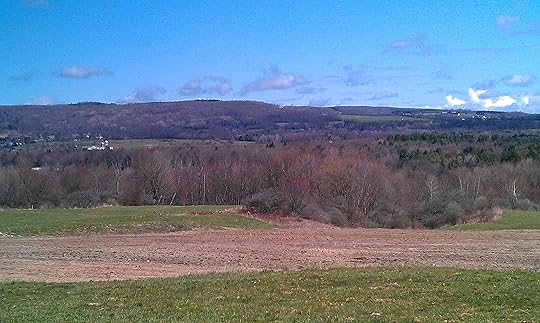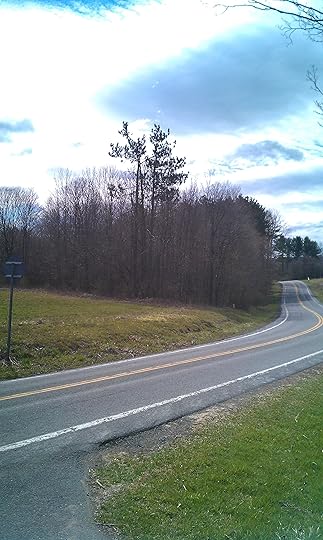Alison McGhee's Blog, page 37
May 19, 2012
Poem of the Week, by Ellen Bass
GATE C 22
- Ellen Bass
At gate C 22 in the Portland airport
a man in a broad-band leather hat kissed
a woman arriving from Orange County.
They kissed and kissed and kissed. Long after
the other passengers clicked the handles of their carry-ons
and wheeled briskly toward short-term parking,
the couple stood there, arms wrapped around each other
like satin ribbons tying up a gift. And kissing.
Like she’d just staggered off the boat at Ellis Island,
like she’d been released from ICU, snapped
out of a coma, survived bone cancer, made it down
from Annapurna in only the clothes she was wearing.
Neither of them was young. His beard was gray.
She carried a few extra pounds you could imagine
she kept saying she had to lose. But they kissed lavish
kisses like the ocean in the early morning
of a calm day at Big Sur, the way it gathers
and swells, taking each rock slowly
in its mouth, sucking it under, swallowing it
again and again. We were all watching—
the passengers waiting for the delayed flight to San Jose,
the stewardesses, the pilots, the aproned woman icing
Cinnabons, the guy selling sunglasses. We couldn’t
look away. We could taste the kisses, crushed
in our mouths like the liquid centers of chocolate cordials.
But the best part was his face. When he drew back
and looked at her, his smile soft with wonder, almost
as though he were a mother still
opened from giving birth, like your mother
must have looked at you,
no matter what happened after—
if she beat you, or left you, or you’re lonely now—
you once lay there, the vernix
not yet wiped off and someone gazing at you
like you were the first sunrise seen from the earth.
The whole wing of the airport hushed,
each of us trying to slip into that woman’s middle-aged body,
her plaid bermuda shorts, sleeveless blouse,
little gold hoop earrings, glasses,
all of us, tilting our heads up.
–
For more information about Ellen Bass, please click here: http://www.ellenbass.com/index.php
–
Facebook: http://www.facebook.com/home.php?#!/pages/Alison-McGhee/119862491361265?ref=ts
May 16, 2012
Thing One
If your house was burning to the ground but you were magically granted one thing from it to save –this doesn’t include the people you love, because they’re already safe and sound and draped in blankets and watching from the neighbors’ yard– what would that one thing be?
This is an easy question to answer: fifty-six journals (hello, since when does fifty-six old journals equal “one thing”? Since right now), one for each year of each of your youthful companions’ lives.
There they are up there, a bunch of them anyway. You’re missing one, the very first one, which you started when the oldest of your youthful companions was born. That was the guinea pig journal. It began life as an 18-month Batman wall calendar. It was big, with a square for each day of each month. You can still see it perfectly in your mind, although it disappeared fifteen years ago and you have no idea where it might be or if it still exists.
You filled in a day here and a day there on that giant Batman wall calendar, using a calligraphy marker because the letters were bigger and it took you less time to fill in a day. Still, that Batman calendar was a reminder of constant failure, so many more white unwritten-on days than the few haphazardly filled in with green and blue and red calligraphy marker.
In the beginning you had the best of intentions. Every day of your children’s lives would be recorded, every milestone written down for posterity. What the hell were you thinking? Obviously you didn’t know that it would be all you could do to get from one day to the other.
Over many years the ritual evolved into what it still is: every few days, or weeks even, you sit at the dining table at dawn, listening to music and writing in one of the journals, about one of the youthful companions. What she was doing, or what she said, or the way you glimpsed her on the street the other day, or the way her voice sounded when she called you that one breathless day.
You might write down something secret, something that she doesn’t know, such as the fact that every night before you go to bed you open up her closed bedroom door and take a deep breath, because it still smells exactly like her even though she lives so far away now.
Were it not for your cell phone camera you would have no photos. You have no organized photo books of your youthful companions, no filled-in baby books. No scrapbooks. In the basement are three enormous plastic bins shoved full of haphazard mementoes: a tiny stuffed panda bear, tickets to performances, old report cards, History Day projects, birthday cards. Someday you’ll go through them all. Or maybe you won’t.
But the house is burning down and you can save only one thing. That’s the rule, right? Fifty-six journals it is, then, all of which equal only one thing.
May 13, 2012
Teaching, part one: And when the world falls to decline -
 This was a long time ago. In the wake of something awful you upheaved your entire life in a matter of weeks: you left the city you loved, you left your friends, you left your family, you bought a crappy car and you took a job teaching a crappy class in speed reading and mnemonics, a job that moved you from southern college to southern prep school every four weeks. You traveled alone, lived alone, did everything alone except when you were standing in front of the students whose parents had signed them up to take the crappy class.
This was a long time ago. In the wake of something awful you upheaved your entire life in a matter of weeks: you left the city you loved, you left your friends, you left your family, you bought a crappy car and you took a job teaching a crappy class in speed reading and mnemonics, a job that moved you from southern college to southern prep school every four weeks. You traveled alone, lived alone, did everything alone except when you were standing in front of the students whose parents had signed them up to take the crappy class.
You have no idea why you’re thinking about that year these days, those colleges and prep schools, these days, but you are. You still feel guilty at the thought of that stupid class you taught, and the money the students’ parents paid for it.
Speed reading? Why should anyone speed read? What’s the point? And mnemonics too. Mnemonics are kind of cool, in a way –to this day you can memorize an extremely long number in 30 seconds flat– but do they have any real use for a person’s education? No.
But the job was there and you took it for one reason only: to get out of the life you knew, because that life was shredded beyond recognition. The only problem was that once you were out of that life and speeding down I-95 in your new crappy car, you realized that you were still inside yourself, and so was the shredded life.
Too late. You had left everything behind. Your sister had a new roommate. There was no place for a car in the city. The dotted line had been signed. A whole year of four weeks here, four weeks there stretched before you, and you had to make it through.
Once a month a slender wad of twenties arrived at whatever school you happened to be at, wrapped in folds of paper and sent through the U.S. mail. The slender wad of twenties didn’t cover lodging, gas and food, so one of the three had to go, and it was usually lodging.
You camped in state parks a lot that year, you and your pup tent and sleeping bag and Apple IIc, which you lugged to whatever electrical outlet you could find, usually attached to a primitive shower/outhouse building.
Once a ranger came to check on you. You and he were the only ones in the entire park. This was somewhere in Tennessee, you’re pretty sure.
“Miss? You going to be all right out here?” he said in his soft southern accent. “It’s pretty cold at night now.”
“Oh sure,” you said, putting on your fake tough-northerner voice.
He was right. It was cold. You used to stay in places like Wendy’s until it was close to closing. You ate a lot of Wendy’s baked potatoes with various toppings. Sometimes you ordered chili and took as many of the cellophane-wrapped crackers as you could back to the tent.
You could not get away from yourself no matter what you tried. You called your friends from pay phones but they were all still in their lives and you missed them. You missed your life. You had to figure out a new one but you didn’t know how.This was supposed to be a new life but it wasn’t.
You rummaged around for anything that would lift you out of yourself. Reading worked, for a while. Sink into a big fat book. Driving, fast and for hours on end, worked. Dancing worked. At one college –in Louisiana, maybe?– they let you stay in the infirmary, which was empty.
The little infirmary room was tiny, with a narrow vinyl bed, a sink, cinderblock walls. This infirmary had a long hallway with polished tile floors. Late at night it was dark in there and you blasted music from your boombox and danced up and down the dark hallway.
This infirmary dancing is the most distinct memory you have from that entire year. Hugely loud music filled up your ears and drove everything else away. What were you listening to? Warren Zevon. Joan Armatrading. Annie Lennox. The driving beat of some of those songs, and Annie Lennox’s enormous soaring voice, was perfect for the way you felt. That was a year of loud, loud music.
And I’ll be (the ticking of your clock)
And I’ll be (the numbers on your watch)
And I’ll be (your hands to stop the time)
I’ll even be your danger sign.
What else lifted you out of yourself? Teaching.
Teaching was something you didn’t even think about when you took the job. Your only goal was to get the hell out. Teaching had nothing to do with anything; it was a means to an end.
Until you stood in front of the first class on the first day, looking out at those students sitting there with their notebooks and pens, and opened your mouth and started to talk. And rolled a piece of chalk around in your hands and turned and wrote on the board, and turned back and talked some more, and watched as hands went up and young faces asked questions, and you answered.
You can do this, you remember thinking. It was as if you were standing outside your body, that poor body, so exhausted and skeletal from loss and confusion, and watching yourself do something that you were born knowing how to do.
Despite being descended from a line of teachers, teaching was not something you had ever considered. Here you were, though. It was a crappy class, and probably useless to those who had paid to take it. But the act itself –teaching– transcended the stupidity of the subject matter.
And it lifted you out of yourself. Those hours that you stood in front of the students, you were finally, finally outside of yourself. Escape.
The girls in the classes you taught were southern girls with southern names, many of them with two first names. You loved saying those names. Some of them you can still remember: Mary-Perron. Cassie Sue. Helen-Mary.
Every day it felt as if you couldn’t bear going into the class and standing up there and talking, and every day, once you were actually in there and doing it, it lifted you out of yourself. Some of your friends loathe the phrase Fake it till you make it, but not you. You love it and you trust it.
Back then you were young and you thought that your suffering was greater than others’. You shake your head at your young self now. You would get angry at her, for such self-centeredness, but that would do no good. Now, when you’re suffering, you don’t try to shove it away. You let yourself be, and you picture everyone else out there who, at this exact moment, is hurting. And paradoxically, the hurting eases.
It would take you many years to see that those times you thought you were standing outside yourself, outside your life, watching yourself, you weren’t.
It’s all the same life.
If you could reach back in time to your 24-year-old self you would tell her, in the wake of awful things, not to leave behind everything she loved and everyone who loved her. You would tell her to do nothing, to stay put, to wake up every morning and make it through each day until it gets better. You would tell her that it will get better.
Because everything changes. In time, everything becomes something else. Even unbearable things become bearable. Wait long enough and they fade and fade and fade until poof, days and weeks go by and you wake up one day and realize you haven’t felt the stab of that particular pain in months. That’s a hurt of a different kind.
One of your students, a southern girl with one of those beautiful hyphenated two-first-names, said to you, on the last day of the three-week class in Virginia, “Alison, you know what? Someday, a long time from now, I’m going to be in an airport, and I’ll see you walking by me, and I’ll call out your name. And we’ll have us a reunion.”
Every time you’re in an airport, surrounded by travelers rushing this way and that with their wheelies, you think of her. You can’t remember what she looks like, or what her voice sounds like. The day might still come, though, when you’re wandering past a Cinnabon or a Hudson News in some anonymous airport, and you hear her call your name.
Sweet dreams are made of this
Who am I to disagree?
I travel the world
And the seven seas
Everybody’s looking for something.
May 12, 2012
Poem of the Week, by Li-Young Lee
Nativity
- Li-Young Lee
In the dark, a child might ask, What is the world?
just to hear his sister
promise, An unfinished wing of heaven,
just to hear his brother say,
A house inside a house,
but most of all to hear his mother answer,
One more song, then you go to sleep.
How could anyone in that bed guess
the question finds its beginning
in the answer long growing
inside the one who asked, that restless boy,
the night’s darling?
Later, a man lying awake,
he might ask it again,
just to hear the silence
charge him, This night
arching over your sleepless wondering,
this night, the near ground
every reaching-out-to overreaches,
just to remind himself
out of what little earth and duration,
out of what immense good-bye,
each must make a safe place of his heart,
before so strange and wild a guest
as God approaches.

–
For more information on Li-Young Lee, please click here: http://www.poetryfoundation.org/bio/li-young-lee
–
Facebook: http://www.facebook.com/home.php?#!/pages/Alison-McGhee/119862491361265?ref=ts
May 5, 2012
Poem of the Week, by Paul Farley
The Power
- Paul Farley
Forget all of that end-of-the-pier
palm-reading stuff. Picture a seaside town
in your head. Start from its salt-wrack-rotten smells
and raise the lid of the world to change the light,
then go as far as you want: the ornament
of a promenade, the brilliant greys of gulls,
the weak grip of a crane in the arcades
you’ve built, ballrooms to come alive at night,
then a million-starling roost, an opulent
crumbling like cake icing …
Now, bring it down
in the kind of fire that flows along ceilings,
that knows the spectral blues; that always starts
in donut fryers or boardwalk kindling
in the dead hour before dawn, that leaves pilings
marooned by mindless tides, that sends a plume
of black smoke high enough to stain the halls
of clouds. Now look around your tiny room
and tell me that you haven’t got the power.
–
For more information on Paul Farley, please click here: http://www.poetryarchive.org/poetryarchive/singlePoet.do?poetId=27
–
Facebook: http://www.facebook.com/home.php?#!/pages/Alison-McGhee/119862491361265?ref=ts
April 28, 2012
Poem of the Week, by Marie Howe
What the Living Do
- Marie Howe
Johnny, the kitchen sink has been clogged for days, some utensil probably
fell down there.
And the Drano won’t work but smells dangerous, and the crusty dishes
have piled up
waiting for the plumber I still haven’t called. This is the everyday we
spoke of.
It’s winter again: the sky’s a deep headstrong blue, and the sunlight
pours through.
The open living room windows because the heat’s on too high in here, and
I can’t turn it off.
For weeks now, driving, or dropping a bag of groceries in the street,
the bag breaking,
I’ve been thinking: This is what the living do. And yesterday, hurrying
along those
wobbly bricks in the Cambridge sidewalk, spilling my coffee down my
wrist and sleeve,
I thought it again, and again later, when buying a hairbrush: This is it.
Parking. Slamming the car door shut in the cold. What you called
that yearning.
What you finally gave up. We want the spring to come and the winter to
pass. We want
whoever to call or not call, a letter, a kiss – we want more and more and
then more of it.
But there are moments, walking, when I catch a glimpse of myself in the
window glass,
say, the window of the corner video store, and I’m gripped by a cherishing
so deep
for my own blowing hair, chapped face, and unbuttoned coat that I’m
speechless:
I am living, I remember you.
–
For more information on Marie Howe, please click here: http://www.mariehowe.com/
–
Facebook: http://www.facebook.com/home.php?#!/pages/Alison-McGhee/119862491361265?ref=ts
April 21, 2012
Poem of the Week, by William Stafford
Father’s Voice
- William Stafford
“No need to get home early;
the car can see in the dark.”
He wanted me to be rich
the only way we could,
easy with what we had.
And always that was his gift,
given for me ever since,
easy gift, a wind
that keeps on blowing for flowers
or birds wherever I look.
World, I am your slow guest,
one of the common things
that move in the sun and have
close, reliable friends
in the earth, in the air, in the rock.

–
For more information on William Stafford, please click here: http://www.poetryfoundation.org/bio/william-e-stafford
–
Facebook: http://www.facebook.com/home.php?#!/pages/Alison-McGhee/119862491361265?ref=ts
April 18, 2012
6 Mile
Some of the things it’s possible to do while walking the six-mile block you walk every day when you’re back in the land where you grew up:
Look north to the foothills of the Adirondacks and think, as you always do, how cool it is that a fifteen-minute drive behind the wheel of a car will bring you into the six million-acre Adirondack Park itself.
Lift your hand in greeting to each and every car that comes toward you, and watch as each and every driver lifts his hand back to you.
Observe all the Amish laundry h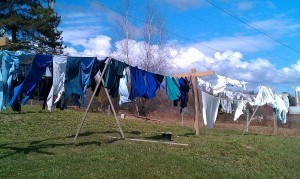 anging on Amish clotheslines. Decide, based on your observations over all six miles, that Amish men do not wear underwear and Amish women do not wear bras.
anging on Amish clotheslines. Decide, based on your observations over all six miles, that Amish men do not wear underwear and Amish women do not wear bras.
Notice that a few pairs of underwear are colors other than blue, black or white. Wonder if these colored undies are breaking a covert Amish rule. Decide that the answer is no, because otherwise they wouldn’t be hanging on the line for all to see.
Take a left on Crill Road and 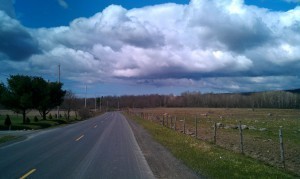 wait for the flock of wild turkeys to cross. Take your time, wild turkeys. Note a line of them in a distant field, walking single file with their heads bobbing up and down. Recall that your father told you they follow the manure spreader, picking out the corn that the cows didn’t absorb.
wait for the flock of wild turkeys to cross. Take your time, wild turkeys. Note a line of them in a distant field, walking single file with their heads bobbing up and down. Recall that your father told you they follow the manure spreader, picking out the corn that the cows didn’t absorb.
Think about all the wild turkeys you’ve seen lately: walking down the sidewalks in northeast Minneapolis, flocking on either side of the road the entire length of the Natchez Trace, and now here in upstate New York. Decide that wild turkeys are taking over the highways and byways of your fair nation, and wonder where it will all end.
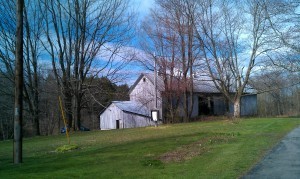 Walk past this barn, which is the barn you grew up playing in, and think of all the hours you spent in it. Hayforts. Hay tunnels. Hay rooms underneath haystacks, in which you read by flashlight. Years of trying and not always succeeding to avoid the gaping holes in the floorboards. Think how great it is to be in your unsafe homeland, how great it is that those gaping holes are still there in the barn, along with the wide-open rectangles in the far wall. Decide that your nephew, the one who “fell” twenty feet to the ground out one of them and came up laughing, didn’t fall but leapt.
Walk past this barn, which is the barn you grew up playing in, and think of all the hours you spent in it. Hayforts. Hay tunnels. Hay rooms underneath haystacks, in which you read by flashlight. Years of trying and not always succeeding to avoid the gaping holes in the floorboards. Think how great it is to be in your unsafe homeland, how great it is that those gaping holes are still there in the barn, along with the wide-open rectangles in the far wall. Decide that your nephew, the one who “fell” twenty feet to the ground out one of them and came up laughing, didn’t fall but leapt.
 Count the number of Amish baked goods signs along the six miles and wish that it were Friday. Consider the spelling of “donut” as opposed to “doughnut.” Come down firmly on the side of “doughnut” but recognize wearily that you are out of step with the rest of the world when it comes to doughnuts.
Count the number of Amish baked goods signs along the six miles and wish that it were Friday. Consider the spelling of “donut” as opposed to “doughnut.” Come down firmly on the side of “doughnut” but recognize wearily that you are out of step with the rest of the world when it comes to doughnuts.
Ask yourself: if this were Friday, which kind of Amish do(ugh)nut would you buy? There is no question: Cream Filled. The minute you decide on Cream Filled, immediately change your mind to Glazed. Decide that if this were Friday, you would buy four of each and take the whole box –wait, do the Amish use boxes?– home to your parents.
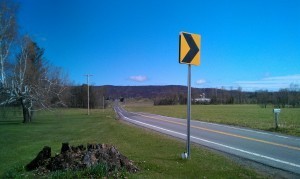 Wonder why, in recent years, you crave the wide-open west so much instead of these foothills and mountains you grew up in. Wonder if you’ll someday trade your one-room plumbingless shack on the slope in Vermont for a one-room plumbingless shack in Montana. Realize, as you walk the six miles of this block, that the wide-open west and the land where you grew up have much more in common than you ever thought.
Wonder why, in recent years, you crave the wide-open west so much instead of these foothills and mountains you grew up in. Wonder if you’ll someday trade your one-room plumbingless shack on the slope in Vermont for a one-room plumbingless shack in Montana. Realize, as you walk the six miles of this block, that the wide-open west and the land where you grew up have much more in common than you ever thought.
Stop by and say hi to a friend. Wonder why the photo of his grave is so much bigger than your other photos.
Keep walking. Walk to the house where your friend and his wife lived. Walk across the grass and sit on the front steps of their house. Look out over the fields stretching south, the fields and the woods, and talk to him. Charlie, I’m sitting on your front steps. I’m looking out over the valley.  Remember how you always told me it was God’s country?
Remember how you always told me it was God’s country?
Keep walking. Walk down the road to where your friend’s brother lives. See him coming out of the barn. Start to run so that you can catch up to him before he goes into the house. See him stop walking when he sees you coming. Listen as the first thing he says is, “I like your sneakers, Alison,” with his head down. Listen to yourself say, “I’m so sorry,” as you both start to cry. Sit on the porch with him and his wife for a long time, talking.
Stay up late with your father, sitting across the kitchen table, talking. Get up early and go to the diner with him next morning. Ride shotgun in his car as he drives you down the dirt road to the ten acres they’re having surveyed, because you can’t stand the thought of not having a piece of this land once the Amish have bought their place and they leave it. Stand with your father by the edge of the ten acres and point to a knoll that would be a pretty place to put up a plumbingless one-room shack.
When you leave next morning, have a hard time leaving.
April 16, 2012
Poem of the Week, by Jennifer Michael Hecht
Lady Look-Alike Lazarized
- Jennifer Michael Hecht
It was many, many years ago
in this house, with this tree
that a woman lived, whom I don’t know
in a photo you can see. She baked bread
and ate with two fat men
and her picture looks much like me.
I was a child and she was a child
then neither again would be
she in nineteen-thirteen
me near two-zero, one-three.
And we loved with a love that was more
than a love, at the heads of our centuries.
Let me see less than she’ll see
because I know more than she
and, even from here, it near-blinded me.
And with virtue and reason, long ago,
In this picture that looks like me,
A bug blew out of a cough one night,
chilling the woman who looks like me;
So her muscled kinsman came
and took her away from our tree
to bake no more bread for fat men
and escape the brutality.
Yes, a wind blew out of a cloud
one night chilling and killing
who looks like me.
Microbes, heartache, and wars
do not give way to reason nor pause
at the soaring wrought-iron gate
of Brooklyn, nor at the doors of state.
She was here and some time later died,
well before I arrived here or anywhere.
But our love, she for fat men, I for my
small and tall friends, is stronger by far
than the love of those younger or richer
than we, and who could be wiser than we?
And neither the redbreasts in heaven above,
Nor the dolphins down under the sea,
Can ever quite sever my sight from the sight
Of the woman who looks like me.
For the moon rarely beams without bringing
dark dreams to the woman who looks like me;
And the stars never rise but I feel my tight eyes
on a dark dream that looks like me; And so,
all nighttime, I lie down by the side of my
searching self and my self that hides. With a
photo from nineteen-hundred, one and three,
of a woman who looks a lot like me.

–
For more information on Jennifer Michael Hecht, please click here: http://www.jennifermichaelhecht.com/
–
Facebook: http://www.facebook.com/home.php?#!/pages/Alison-McGhee/119862491361265?ref=ts
April 7, 2012
Poem of the Week, by Tony Hoagland
The Best Moment of the Night
- Tony Hoagland
You had a moment with the dog,
down near the base of the butcher-block table
just as the party was getting started.
Just as the guests were bringing in
their potluck salads and vegetarian lasagna,
setting them down on the buffet,
you had an unforeseeable exchange of warmth
with this scruffy, bug-eyed creature
who let you scratch his ears.
He lives down there, among the high heels
and the cowboy boots, below the human roar
rising to its boil up above. Like his, your evening
is just beginning –but you
are lonelier than him. You think
that if you disappeared tonight,
you would not be missed for years;
yet here, the licking of the hands and face;
and here, the baring of the vulnerable belly.
You are still panting, and alive, and seeking love;
yet no one who knows you
knows, somehow,
about your wet, black nose,
or that you can wag your tail.

–
For more information on Tony Hoagland, please click here: http://www.tonyhoagland.com/
–
Facebook: http://www.facebook.com/home.php?#!/pages/Alison-McGhee/119862491361265?ref=ts


